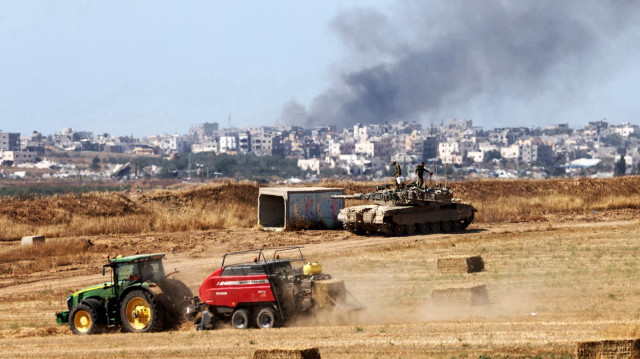
Mounting war expenses topping $12 billion and looming public finance challenges
The Israeli economy is paying the price of the 12-day conflict with Iran, as the cost of the war reached hundreds of millions of dollars, according to media reports and experts.
Israel spent around $5 billion in the first week of the attacks on Iran, according to the Financial Express website, while the daily expenses of the war reached $725 million, $593 million of which were used for attacks and $132 million allocated for defensive measures and military mobilization.
The Wall Street Journal reported that the daily cost of anti-missile air systems ranged from $10 million to $200 million for Israel.
The total cost could have reached over $12 billion had the attacks gone on for a month, according to the Israel-based Aaron Institute for Economic Policy.
Naser Abdelkarim, an assistant professor of finance at the American University of Palestine, told Anadolu that the attacks did not only directly affect Israel's military spending but also the country's production activities, noting that directly and indirectly, the war could cost Israel up to $20 billion.
Abdelkarim stated that Israel's budget deficit is expected to rise by 6% and that the compensation payments to affected citizens will further deteriorate the country's public finances.
The number of Israelis evacuating their homes in the first week exceeded 10,000, and some 36,465 people filed for compensation, according to the Israel Tax Authority.
Abdelkarim said that the Israeli government is considering one of the three following measures to cover the widening budget deficit: cutting down on public spending on health and education, increasing taxes, or resorting to borrowing, which could bump up the public debt to national income ratio by over 75%.
The Israeli Ministry of Finance revealed that the current financial resources of the country are rapidly depleting, and it requested $857 million to be transferred to the Ministry of Defense, while requesting $200 million of cuts from health, education, and social services ministries.
Israeli financial newspaper Globes reported that most of these funds would be used to cover military personnel expenses.
Some 450,000 reservists were called for duty as a part of the large-scale mobilization efforts during the war.
Abdelkarim stated that the Israeli shekel against the US dollar fell to 3.7 after the war began but recovered to 3.5, noting that the dollar's weakness and speculative transactions have also been effective in this slight recovery.
- Investor panic weighs on Israeli economy
Experts warn that Israel's growth rate could slow, unemployment could rise, and poverty rates could increase if the conflict continues.
Iran has targeted critical infrastructure in Tel Aviv and Haifa, including an attack that shut down Bazan, Israel's largest oil refinery, causing an estimated daily loss of $3 million, according to Financial Times.
Ben Gurion Airport suspended operations in response to Iran's retaliatory strikes. The airport typically handles about 300 flights and 35,000 passengers daily and has only partially reopened as of Sunday for repatriation purposes. This disruption could very well result in even greater economic losses.
The country's largest airport's suspension coincided with Israel's national airline El Al suspending flights and diverting aircraft, to prevent any threat of being targeted.
A flight to Paris was diverted en route and landed in the Greek Cypriot Administration and one to Bangkok was forced to land in Rome.
The operational costs of this development alone are expected to reach around $6 million.
Financial markets have also suffered due to the escalation of military tensions, such as the case of Iranian missiles recently striking Israel's diamond exchange, a sector that represents roughly 8% of Israel's total exports.
According to the Israel Diamond Institute, the attacks triggered concerns in the Tel Aviv Stock Exchange.
The blow to stocks caused panic among investors, leading to selloffs and accelerating a market turndown, which in turn, has jeopardized economic stability in the short term.
- Ceasefire agreed
US President Donald Trump on Monday announced that Israel and Iran had agreed to a "complete and total" ceasefire amid the rising conflict in the Middle East. The ceasefire came into effect at 0400GMT Tuesday, with Trump urging both sides not to violate it.
However, Israeli Defense Minister Israel Katz ordered his army earlier Tuesday to launch intense strikes on Tehran, accusing Iran of violating the truce. Iran denied the claim, vowing a resolute response to any new strikes.
On Monday, Iran launched a barrage of missiles at the US military's Al Udeid Air Base in Qatar, marking a dramatic escalation in tensions following the US targeting of three Iranian nuclear sites Sunday.
The US attacks were the latest escalation in a US-backed Israeli military assault on Iran since June 13, prompting Tehran to launch retaliatory attacks on Israel.
Israeli authorities said at least 25 people had been killed and hundreds injured since then in Iranian missile attacks.
Meanwhile, in Iran, at least 430 people have been killed and more than 3,500 wounded in the Israeli assault, according to the Iranian Health Ministry.







